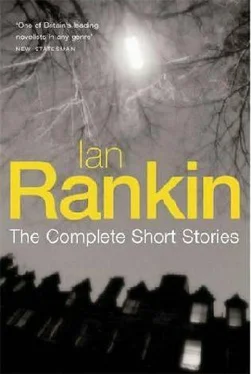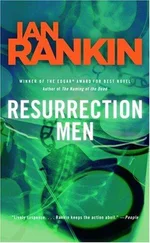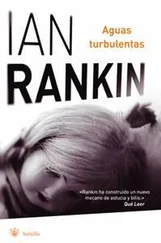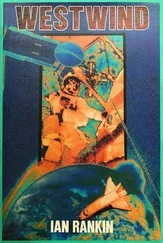Then the door to the toilets opened with a nerve-jarring squeal, and a man loped out. He was tall and skinny, looselimbed, hair falling over his eyes. He had a hand on his fly, just checking prior to departure, and his eyes were on the floor.
‘See youse then,’ he said to nobody, opening the front door to leave. Nobody responded. The door stayed open longer than it should. Someone else was coming in. Eyes flashed from the TV for a moment. Rebus finished his drink and rose from the stool. He knew the man who’d just left the bar. He knew him well. He knew, too, that what had just happened was impossible.
The new customer, a small man with a handful of coins, had a voice hoarse from shouting as he croakily ordered a pint. The barman didn’t move. Instead, he looked to Rebus, who was looking at Bernie Few.
Then Bernie Few looked at Rebus.
‘Been down to Princes Street, Bernie?’ Rebus asked.
Bernie Few sighed and rubbed his tired face. ‘Time for a short one, Mr Rebus?’
Rebus nodded. He could do with another himself anyway. He had a couple of things on his mind, neither of them Bernie Few.
Police officers love and hate surveillance operations in more or less equal measure. There’s the tedium, but even that beats being tied to a CID desk. Often on a stakeout there’s a good spirit, plus there’s that adrenal rush when something eventually happens.
The present surveillance was based in a second-floor tenement flat, the owners having been packed off to a seaside caravan for a fortnight. If the operation needed longer than a fortnight, they’d be sent to stay with relations.
The watchers worked in two-man teams and twelve-hour shifts. They were watching the second-floor flat of the tenement across the road. They were keeping tabs on a bandit called Ribs Mackay. He was called Ribs because he was so skinny. He had a heroin habit, and paid for it by pushing drugs. Only he’d never been caught at it, a state of affairs Edinburgh CID were keen to rectify.
The problem was, since the surveillance had begun, Ribs had been keeping his head down. He stayed in the flat, nipping out only on brief sorties to the corner shop. He’d buy beer, vodka, milk, cigarettes, sometimes breakfast cereal or a jar of peanut butter, and he’d always top off his purchases with half a dozen bars of chocolate. That was about it. There had to be more, but there wasn’t any more. Any day now, the operation would be declared dead in the water.
They tried to keep the flat clean, but you couldn’t help a bit of untidiness. You couldn’t help nosy neighbours either: everyone on the stairwell wondered who the strangers in the Tully residence were. Some asked questions. Some didn’t need to be told. Rebus met an old man on the stairs. He was hauling a bag of shopping up to the third floor, stopping for a breather at each step.
‘Help you with that?’ Rebus offered.
‘I can manage.’
‘It wouldn’t be any bother.’
‘I said I can manage.’
Rebus shrugged. ‘Suit yourself.’ Then he climbed to the landing and gave the recognised knock on the door of the Tullys’ flat.
DC Jamphlar opened the door a crack, saw Rebus, and pulled it all the way open. Rebus nipped inside.
‘Here,’ he said, handing over a paper bag, ‘doughrings.’
‘Thank you, sir,’ said Jamphlar.
In the cramped living-room, DC Connaught was sitting on a dining chair at the net curtain, peering through the net and out of the window. Rebus joined him for a moment. Ribs Mackay’s window was grimy, but you could see through the grime into an ordinary-looking living-room. Not that Ribs came to the window much. Connaught wasn’t concentrating on the window. He was ranging between the second-floor window and the ground-floor door. If Ribs left the flat, Jamphlar went haring after him, while Connaught followed Ribs’s progress from the window and reported via radio to his colleague.
Initially, there’d been one man in the flat and one in a car at street level. But the man at street level hadn’t been needed, and looked suspicious anyway. The street was no main thoroughfare, but a conduit between Clerk Street and Buccleuch Street. There were a few shops at road level, but they carried the look of permanent closure.
Connaught glanced up from the window. ‘Afternoon, sir. What brings you here?’
‘Any sign of him?’ Rebus said.
‘Not so much as a tweet.’
‘I reckon I know why that is. Your bird’s already flown.’
‘No chance,’ said Jamphlar, biting into a doughring.
‘I saw him half an hour ago in Scott’s Bar. That’s a fair hike from here.’
‘Must’ve been his double.’
But Rebus shook his head. ‘When was the last time you saw him?’
Jamphlar checked the notebook. ‘We haven’t seen him this shift. But this morning Cooper and Sneddon watched him go to the corner shop and come back. That was seven-fifteen. ’
‘And you come on at eight?’
‘Yes, sir.’
‘And you haven’t seen him since?’
‘There’s someone in there,’ Connaught persisted. ‘I’ve seen movement.’
Rebus spoke slowly. ‘But you haven’t seen Ribs Mackay, and I have. He’s out on the street, doing whatever he does.’ He leaned closer to Connaught. ‘Come on, son, what is it? Been skiving off? Half an hour down the pub, a bit of a thirst-quencher? Catching some kip on the sofa? Looks comfortable, that sofa.’
Jamphlar was trying to swallow a mouthful of dough which had become suddenly dry. ‘We’ve been doing our job!’ he said, spraying crumbs.
Connaught just stared at Rebus with burning eyes. Rebus believed those eyes.
‘All right,’ he conceded, ‘so there’s another explanation. A back exit, a convenient drainpipe.’
‘The back door’s been bricked up,’ Connaught said stiffly. ‘There’s a drainpipe, but Ribs couldn’t manage down it.’
‘How do you know?’
‘I know.’ Connaught stared out through the curtain.
‘Something else then. Maybe he’s using a disguise.’
Jamphlar, still chewing, flicked through the notebook. ‘Everyone who comes out and goes in is checked off.’
‘He’s a druggie,’ said Connaught. ‘He’s not bright enough to fool us.’
‘Well, son, that’s just what he’s doing. You’re watching an empty flat.’
‘TV’s just come on,’ said Connaught. Rebus looked out through the curtain. Sure enough, he could see the animated screen. ‘I hate this programme,’ Connaught muttered. ‘I wish he’d change the channel.’
‘Maybe he can’t,’ said Rebus, making for the door.
He returned to the surveillance that evening, taking someone with him. There’d been a bit of difficulty, getting things arranged. Nobody was keen for him to walk out of the station with Bernie Few. But Rebus would assume full responsibility.
‘Damned right you will,’ said his boss, signing the form.
Jamphlar and Connaught were off, Cooper and Sneddon were on.
‘What’s this I hear?’ Cooper said, opening the door to Rebus and his companion.
‘About Ribs?’
‘No,’ said Cooper, ‘about you bringing the day shift a selection of patisseries.’
‘Come and take a look,’ Sneddon called. Rebus walked over to the window. The light was on in Ribs’s living-room, and the blinds weren’t shut. Ribs had opened the window and was looking down on to the night-time street, enjoying a cigarette. ‘See?’ Sneddon said.
‘I see,’ said Rebus. Then he turned to Bernie Few. ‘Come over here, Bernie.’ Few came shuffling over to the window, and Rebus explained the whole thing to him. Bernie thought about it, rasping a hand over his chin, then asked the same questions Rebus had earlier asked Jamphlar and Connaught. Then he thought about it some more, staring out through the curtain.
Читать дальше












